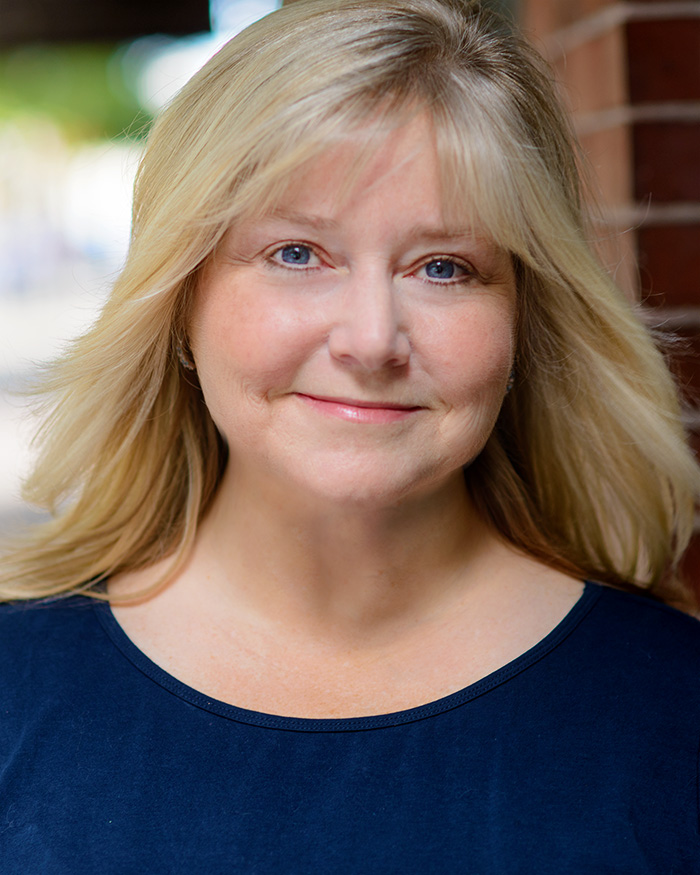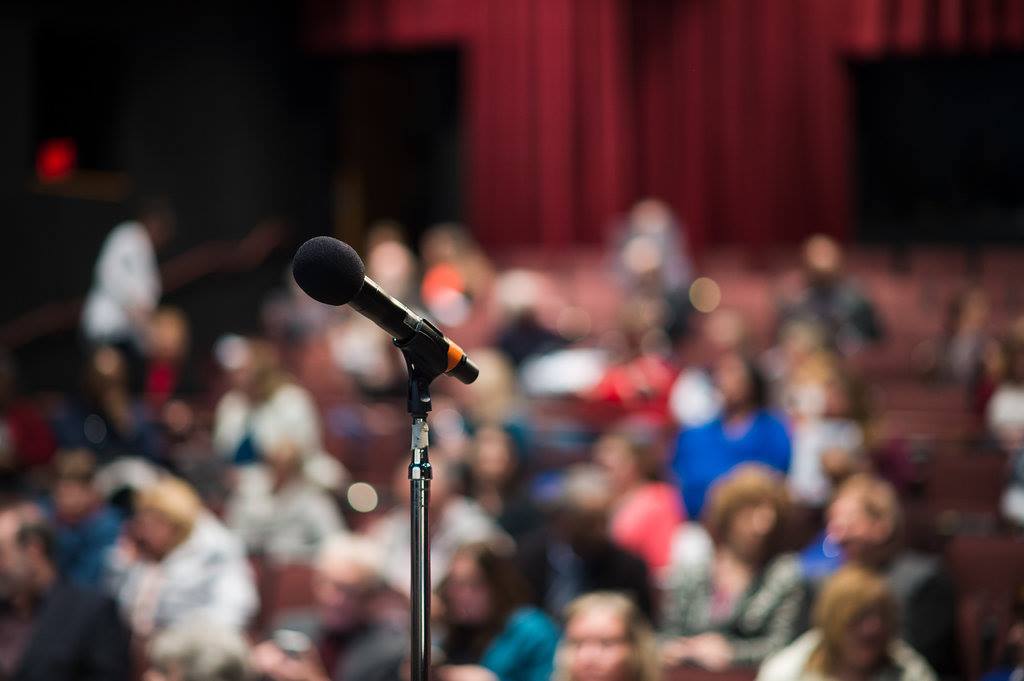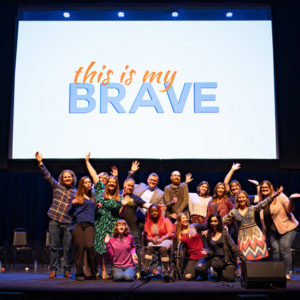Finding Un-Brave
by Traci Powell
For a long time, I wore my “brave” badge like a scarlet letter on my chest. I was constantly told about how brave I was. Brave for choosing to become a single mom and raising my children on my own. Brave for going to graduate school and becoming a nurse practitioner. Brave for working in a NICU with the tiniest of humans. Brave for running 1/2 marathons. Brave for going public with my story of child sexual abuse and complex PTSD. Brave for being willing to stand on a stage and talk about my journey.
I was so convinced of my brave-ness that I bought into it. I began to believe that in order to make it through life you had to be brave. That to show up in the world meant to grin and bear it with a smile, never allowing my humanity, hurts and vulnerabilities to show.
Brave never sat well with me, however. In fact, it was fucking hard. And lonely. And isolating. Brave was indeed my scarlet letter. A big letter B on my chest that to the outside world stood for brave, but to me, meant broken. The truth was that I was never brave. I was bruised, bullied and mentally beaten into believing life was about showing up for everyone else and leaving myself behind.
Turns out, what I and everyone else thought was me being brave, was actually dissociation. I had separated from the abuse that I endured, which made me separate from myself. I left that part of me behind. The part that was the little girl in me who needed my braveness more than anyone, but who I was terrified of. Brave is not terrified. The two cannot exist together. So, I had to be one or the other. I had lived in enough terror, so I shut it down and sided with brave.
My separation from myself and connection to brave resulted in me not paying attention to my own wants and needs. Instead, I spent my life trying to prove my worth and pleasing everyone else. This gave off the facade of brave. Of rising above it all. Super Traci. Untouchable by the past. Brave to the world, but dying inside more each day as the little girl inside me cried harder and harder. My brave made me ignore her. It said, “Nope. Your pain isn’t welcome. Stop crying! Leave the past in the past!”
We often think that being brave is the thing that will help us move forward. That it takes bravery to stand up for what’s right or meet some kind of challenge. But what if we have it all wrong?
Brave kept me stuck. Stuck in the lie that I was not allowed to feel the unbearable pain that comes with years of childhood abuse. Stuck in the lies of self-worthlessness, shame and blame. Stuck in the memories of horrific things that happened to an innocent little girl.
That little girl got tired of my brave. She wore weary of my nonstop going and doing and braving through life. She needed me to be brave for her, but I couldn’t. I was terrified of her. So a battle waged within me. I wanted to keep the facade going of the woman who was rising above it all. Sure that meant I stayed dissociated and disconnected, but didn’t that make me brave? Yet, I was ripping at the seams as I grew older and she grew impatient wanting to be freed of her abuse. As she grew louder, I considered being brave for her and allowing her to tell bits of her story, but I just couldn’t do it. Instead, I beat myself up. I sat soaked in shame asking how someone so supposedly “brave” could be terrified of events from the past that weren’t even happening anymore.
The trouble is, those events felt very much like they were happening in real time to the little girl in me who lived through them. And she was terrified, which terrified me. It made no sense that I couldn’t be brave for her, though. After all, brave was all I knew, so over the years I had developed ultra-brave status. Why was ultra-brave me so weak when it came to facing the past? Was it my kryptonite?
Bravery and courage are generally considered to be synonymous. They are not, however. Courage involves the presence of fear, while bravery lacks it. Bravery just is. It is a characteristic that doesn’t involve much thinking and is simply second nature to those who do brave acts. It is what we see when we see Superman enjoying a relaxed super flight in the sky, chilling out in the clouds, when suddenly he sees below him a bank robbery occurring. Without thought or feelings, he dives down from his sun soaked paradise, swoops into the bank, grabs the bad guy’s gun, saves all of the people in the bank and then scoops up the bad guy and flies him straight to the hands of the police. After he has saved the day, Superman returns to his penthouse in the clouds. No thought. No feeling. His moments of bravery just a detour in his day.
Many who know me know that as a nurse practitioner, I can’t stand that nurses are referred to as super heroes. It drives me out of my mind. Superhero mentality expects nurses to be brave. To act without feeling or concern for themselves. To swoop out of the sky (well, their homes, the nurses station, another patient’s room or even the bathroom when their pants are down) at a moments notice, with no regard for themselves, to be the rescuing heroes people so desperately need no matter how much emotional or physical exhaustion has set in. They must be brave, and if not, shame on them. They must show up, but don’t dare have fear or worry or struggle, because to see our superheroes have fear or worry means that we too, may need to experience those things. To see our superheroes struggle means that we may have to look at our own struggles. That we as a society may need to accept that some serious shit is happening and it is terrifying. But here is the thing. When we strip away the brave and we step into the fear, we take back our humanity. We learn that brave is hiding us from each other and when we can learn to tolerate the fear, we become better humans. Our connections are deeper. We love harder. We truly see each other with compassion and empathy, free of judgement and shame.
Courage is not bravery. Courage is very different. It involves a cause that most commonly includes love, compassion, and empathy. Bravery maintains its essence even without a cause. Courage is a result of mindfulness. Like bravery, it requires being physically present, but courage also requires mental presence. It is the decision to fight despite one’s fears. It is the choice to step into hard things with your whole self – body, mind, and spirit. Brave happens in the mind. Courage happens in the heart.
I am no longer brave, nor am I broken. Turns out, I was never either of those things. I have found the light inside of me that was always there, but I had forgotten due to living through some really dark times. Now, I am un-brave. I left the brave behind and stepped into my courage. I embraced the fear of helping the little girl in me heal from the horrors she had carried for so many years. My courage helped me see her scars, her pain, her need to be seen and loved and protected.
Now, I lead with my heart instead of my head. Without brave, I don’t white knuckle it through life any more. Without brave, I don’t force myself to rise above, deny the past or disconnect from hard truths. With courage, I step into making change, healing others’ hearts, using my voice, sharing my story and tending to my own humanity, partnering with the fear that often wells up in me.
I’m not brave. I’m just me. Full of light and lifted by my light. You see, when you strip away the darkness and lies that others have tried to surround you with, you’re left only with your light. The genuine you. Moving forward in life in ways that are authentic to you. Not because it is brave to rise above and be disconnected from your humanity, but rather because when you become un-brave, you step into your own courage and use it however you genuinely want. Courage has understanding of what you’re doing and who or what you’re doing it for. Courage gives you permission to feel the feels, and connect not only with others, but also with yourself.
Whether you’re a nurse, an abuse survivor, someone with mental health challenges, or whatever has led you to believe that brave is the face you need to show, I hope you give yourself permission to become un-brave. Step into the courage that allows you to embrace the fears that are the key to your strength, your compassion and your humanity, and may you show that courage first to yourself and the parts of you that are hurting, so that you can be genuinely and authentically courageous for others.
Here’s to being un-brave.

About the Author:
Traci Powell is psychiatric/mental health nurse practitioner, internationally Certified Trauma Treatment Specialist, writer, trauma education consultant and an unshakable force dedicated to helping adult survivors of trauma and abuse return to their authentic selves and step into their wholeness. She has been in nursing for almost 30 years. First as a bedside nurse, then as a neonatal nurse practitioner, but after doing much of her own personal healing work, Traci stepped into her true calling as a mental health provider and now has her own private practice, The Rebuilt Woman, where she helps clients find accelerated and lasting healing through a unique, highly individualized, intensive full-day therapy process. Staying true to her personal commitment to end the stigma surrounding mental illness, Traci became part of the TIMB family and produced the 2019 TIMB Orlando show. Most recently, in response to growing suicide rates and worsening mental health among nurses, Traci founded Nurses Healing Nurses, nursing support group whose mission is to heal the heart of nursing and give nurses a safe space to talk about hard things. Link to the Nurses Healing Nurse group on Facebook (for nurses only)

